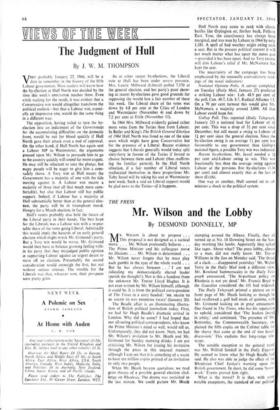EVEY0 L,YE WEIE
The Judgment of Hull
By J. W. M. THOMPSON
VTERY probably January 27, 1966, will be a V date to remember in the history of the fifth Labour government. Most readers will know how The by-election at Hull North was decided by the time this week's SPECTATOR reaches them. Even while waiting for the result, it was evident that a Conservative win would altogether transform the political outlook—but that a Labour win, especi- ally an impressive one, would do the same thing in a different way.
The opposition, having toiled to turn the by- election into an indictment of the Government for the accumulating difficulties on the domestic front, would be out for blood quickly if Hull North gave their attack even a nod of approval. On the other hand, if Hull North has again sent a Labour MP to Westminster, the arguments pressed upon Mr. Wilson to persuade him to go to the country quickly will sound far more cogent. He may still be reluctant to take the plunge, but many people will be eager to give him a com- radely shove. A Tory win at Hull means the Government has a majority of one with the tide moving against it. A Labour win means a majority of three (not all that much more com- fortable), but also that Labour still has public support. Indeed, if Labour has a majority at Hull substantially better than at the general elec- tion, the party will be in triumphant mood. Hungry for a March election, in fact.
Hull's voters probably also held the future of the Liberal party in their hands. The best hope for the Liberals was a Labour win with a respec- table share of the votes going Liberal. Admittedly this would imply the hazards of an early general election which might wreck Mr. Grimond's party. But a Tory win would be worse. Mr. Grimond would then have to balance growing feeling with- in his party that they misjudged public opinion in supporting Labour against an urgent desire to stave off an election. Presumably the second consideration would outweigh the first, but not without serious stresses. The trouble for the Liberals was that, whoever won, their prospects were pretty grim. As at other recent by-elections, the Liberal vote at Hull has been under severe pressure. Mrs. Laurie Millward (Liberal) polled 7,570 at the general election, and her party's poor show- ing at recent by-elections gave good grounds for supposing she would lose a fair number of these this week. The Liberal share of the votes was down by 4.8 per cent at the Cities of London and Westminster (November 4) and down by 7.2 per cent at Erith (November 11).
In 1964 Mrs. Millward evidently gained rather more votes from the Tories than from Labour. In Butler and King's The British General Election of 1964 Hull North was listed as one of the nine seats which might have gone Conservative but for the presence of a Liberal. Recent evidence suggests that Liberals generally would today split sixty-forty in favour of the Tories if forced to choose between them and Labour (thus reaffirm- ing the familiar pattern). In the Hull North situation, if a fair number of Liberal voters reallocated themselves in these proportions Mr. Toby Jessel will be taking his seat at Westminster next week. Such a raid on Liberal support would be glad news to the Tories—if it happens. Hull North may come to rank with classic battles like Orpington or, further back, Fulham East. True, the constituency has always been marginal, and was won by Labour in 1964 by only 1,181. A spell of bad weather might swing such a seat. But in the present political context it will not much matter what has upset the status quo —provided it has been upset. And no Tory excuse will dim Labour's relief if Mr. McNamara has kept the seat.
The uncertainty of the campaign has been emphasised by the unusually contradictory read- ings of the usual indicators: National Opinion Polls. A survey completed on Tuesday (Daily Mail, January 27) predicted a striking Labour win: Lab. 48.9 per cent of the poll, Con. 40.7, Lib. 8.7, Radical Alliance 1.5. On a 70 per cent turnout this would give Mr. McNamara• a majority around 3,000. All that Labour could hope for.
Gallup Poll. This reported (Daily Telegraph, January 21) a national lead for Labour of 41 per cent. This was a drop of 31 per cent since December, but still meant a swing to Labour of 11 per cent since the general election. Since the by-election swing is on average 11 per cent less favourable to any government than Gallup's national figure, a possible Tory win was indicated.
Recent by-elections. Mr. Jessel needed a 11 per cent anti-Labour swing to win. This was fractionally less than the average swing against Labour at the previous five, by-elections (1.36 per cent) and almost exactly that at the last of them (Erith).
One way or another, Hull seemed set to ad- minister a shock to the political system.


































 Previous page
Previous page